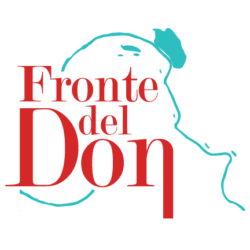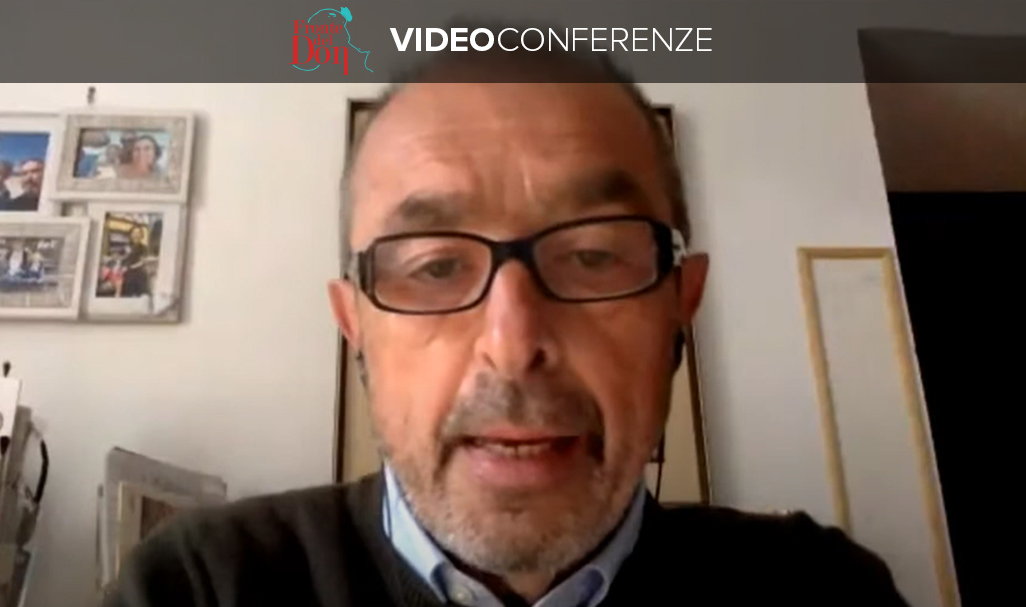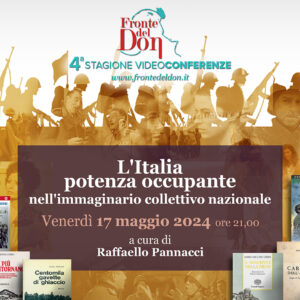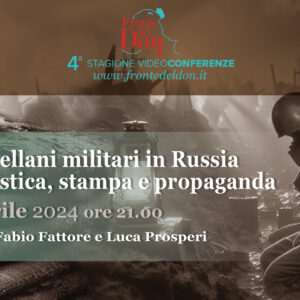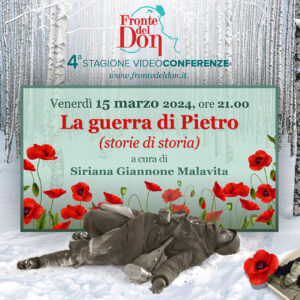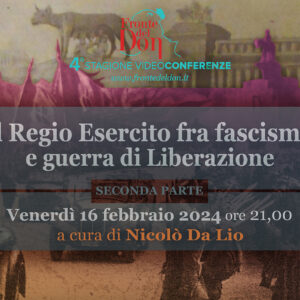A cura di Gustavo Corni
Videoconferenza n. 5 / 29 aprile 2021
ABSTRACT
Nel libro “Raccontare la guerra. La memoria organizzata” (Milano, Bruno Mondadori, 2012), che riprenderà in questa conversazione, il prof. Corni ha cercato di ricostruire, sulla base di centinaia di fonti prodotte in Italia, nella Repubblica Federale Tedesca e nella Repubblica Democratica Tedesca dal 1945 fino alla metà degli anni 60 , i principali aspetti della narrazione pubblica, letteraria, delle vicende belliche sul fronte orientale. In particolare (ma non solo) sotto forma di memorie di chi vi aveva preso parte. Gustavo Corni è stato professore di storia contemporanea presso l’Università di Trento fino al 2018 ed è uno specialista di storia della Germania nel ventesimo secolo e della storia delle dittature fasciste. Relativamente a questo periodo ha prodotto un numero considerevole di studi, tra cui “Breve storia del nazismo” del 2015. Ha inoltre effettuato studi sulla prima guerra mondiale, soffermandosi in particolare sull’occupazione militare austro germanica del Friuli e del Veneto dopo la rotta di Caporetto, producendo un’opera in due volumi La grande guerra in Veneto e in Friuli. Ulteriori dettagli del corposo CV del professore potete trovarli alla sezione Video-conferenze del nostro sito www.frontedeldon.it
CURRICULUM VITAE
Prof. Gustavo Corni
Department of Humanities, University of Trento, Via Tommaso Gar, 14, 38122 Trento (Italy) gustavo.corni@ex-staff.unitn.it Born in Modena, 17/1/1952.
Studies
1970-1974 Studies in History and Political Sciences at the University of Bologna. Degree with honors in October 1974.
Academic career
- 1977-1981 research fellow at the Faculty of Political Sciences (Bologna)
- 1981-1989 Research professor at the Faculty of Humanities (University of Venice)
- 1989 – 1992 Associate Professor of Modern and Contemporary History at the Faculty of
- Foreign Languages, University of Chieti, Pescara branch
- 1992 – 1995 Associate Professor of German History at the Faculty of Humanities, University of Trieste
- 1997 – 2001 Associate professor of Contemporary History at the Faculty of Sociology, University of Trento
- 2001 – full professor of Contemporary History at the Faculty of Sociology, since 2009 at the Faculty of Humanities, Trento.
- Since 2011 also professor of Contemporary History at the School of International Studies, University of Trento
- Since November 2018 retired
Administrative duties
- 2002-2005 Dean of the Department of Human and Social Sciences
- 2005-2008 Vice-President of the Faculty of Sociology
- 2012–2015 Vice-Dean of the Department of Humanities
Scientific career
- 1978-81 fellow at the Institut für Europäische Geschichte – Abt. Universalgeschichte, Mainz
- 1984 (summer) exchange researcher at the Akademie der Wissenschaften (Berlin-DDR)
- 1994 (summer) visiting fellow at the Max-Planck-Institut fūr Geschichte, Göttingen
- 1992, 1995 and 2019 fellow of the Alexander von Humboldt at the Free University Berlin
- 1996/1997 (winter semester) visiting professor at the Institut für Zeitgeschichte, University of Vienna
- 1999/2000 Koerner fellow at the Oxford Centre for Hebrew and Jewish Studies
- 2000-2005 member of the coordination board of the ESF international research project “The
- Impact of National Socialist and Fascist Occupation on Europe”
- 2005-2008 recurrent visiting fellow at the Institut für Zeitgeschichte, Munich
- 2008/2009 senior research fellow at the Frias (Freiburg Institute for Advanced Studies), Historical School
- 2014 and 2017 Fellow at the Forschungkolleg Humanwissenschaften (in Bad Homburg) of the Goethe University of Frankfurt
- Member of the Editorial board of the Journal of Modern European History (2013-2016)
- Member of the Editorial board of Contemporary European History (2014-2015)
- Member of the advisory board of the Zeitschrift f. Agrargeschichte und Agrarsoziologie
- 2012- member of the international network of the research project “World War II: Everyday
- Life in Europe under German Occupation”
- 2014-2018 Scientific coordinator of the digital calendar (in Italian and English, 56 issues) www.lagrandeguerrapiu100.it
- 2001-2012 Member of the steering committee of the international graduate school in history
- “Political communication from the Antiquity to the present” (Universities of Frankfurt, Bologna, Innsbruck, Pavia, Trento)
- 2011-2017 Member of the International Scientific Advisory Board of the Vienna Wiesenthal Institute
- 2014-2015: Coordinator and PI of the strategic research program at the University of Trento: “Wars and Post-wars. Reflections from a centenary”
- 2016-2020 member of the Independent Historical Commission at the German Ministry of Agriculture and Nutrition
- 2019-2021 Scientific coordinator of the research project: “Biennio rosso e biennio nero. Lotte politiche e sociali nel Nordest d’Italia 1919-1922”, with the participation of 11 research institutes of the three regions: Veneto, Friuli-Venezia Giulia and Trentino
Publications
- Editor or co-editor of 14 collections of essays, published in Italian and German (3); the most recent: with M. Bellabarba, Il Trentino e i trentini nella Grande guerra. Nuove prospettive di ricerca, Bologna, Il Mulino, 2017.
- Eighteen monographs published in Italian, one in German, one in English; 2 translated into English, one each in Spanish and Dutch.
- More than 140 essays in journals and chapters of books published in Italian, English, French, German, Slovak, Slovene.
Recent monographs
- Weimar. La Germania dal 1918 al 1933, Rome, Carocci, 2020
- Storia della Germania. Da Bismarck a Merkel, Milan, Il Saggiatore, 2017 (revised and updated. First edition, 1995)
- Breve storia del nazismo 1920-1945, Bologna, Il Mulino 2015 (Spanish: Madrid, Alianza Editorial, 2017)
- Raccontare la Guerra. La memoria organizzata, Milan, Bruno Mondadori, 2012
- Fascismo: condanne e revisioni, Rome, Salerno, 2011
- Popoli in movimento, Palermo, Sellerio, 2009 (co-authored), People on the move: forced population movements in the second world war and its aftermath, Oxford, Berg, 2009
- Hitler, Bologna, Il Mulino, 2007
- Il sogno del grande spazio. Le politiche d’occupazione nell’Europa nazista, Rome, Laterza, 2005
- I ghetti di Hitler. Voci da una società sotto assedio (1939-1944), Bologna, Il Mulino, 2001
- (English: London, Arnold, 2002. Dutch: Laren, Verbum, 2008).
Recent and current research interests
- A comparative history of the military occupations by the Central Empires during the First world war.
- The literary memory of the Second World war in Italy and Germany.
- The history of the German Ministry of Agriculture from the war to the end of the Weimar Republic.
- A biography of Wilhelm II, the last emperor of Germany.
Visita Sezione VIDEOCONFERENZE
CRONOLOGIA DELLA CONFERENZA
00:00 – Inizio conferenza prof. Corni.
01:30 – La storia familiare come spunto per la ricerca.
04:00 – Come si può costruire un racconto credibile di una guerra perduta.
05:30 – La narrazione del Fronte Orientale nelle due Germanie.
07:30 – La memoria costruita dal basso, esercizio possibile solo nelle democrazie.
09:00 – Il peso dello sterminio degli ebrei nel dopo guerra, confrontato con quello della sconfitta.
10:00 – L’importanza della Resistenza nella narrazione italiana e nella costruzione di una memoria.
12:00 – La descrizione delle fonti: racconti, diari, stampa, cinematografia.
15:00 – Il peso della campagna di Russia nel contesto della guerra degli italiani.
17:00 – Il perché in Germania il Fronte Orientale sia al centro della narrazione. Coinvolti 8 milioni di tedeschi con 4,5 milioni di caduti.
21:00 – Nella DDR l’unica esperienza di guerra narrata è quella sul Fronte Orientale e lo fanno esponenti del partito Comunista. L’autocritica, come approccio ideologico.
23:00 – Il racconto italiano.
27:00 – Il viaggio di andata: gli italiani ne raccontano le genti, i tedeschi la natura.
29:00 – Il cuore del racconto italiano parte dal Don.
31:00 – La religiosità nel racconto italiano e la totale assenza di questa in quello tedesco.
33:00 – Il racconto del sacrificio per arrivare a casa, elemento centrale nella narrazione degli Italiani.
35:00 – La disparità del confronto tra Italia e Germania nei tempi, nei luoghi e nel numero di uomini.
37:00 – Stalingrado elemento centrale nella narrazione tedesca, unitamente alla difesa della Patria ed alla protezione dell’esodo di 12 milioni di persone in fuga davanti all’avanzata sovietica.
40:30 – Le differenze tra Italia e Germania nel narrare la guerra.
42:30 – L’attribuzione della colpa della guerra nella narrazione italiana ed in quella tedesca.
48:00 – Fine della conferenza, inizio delle domande.
